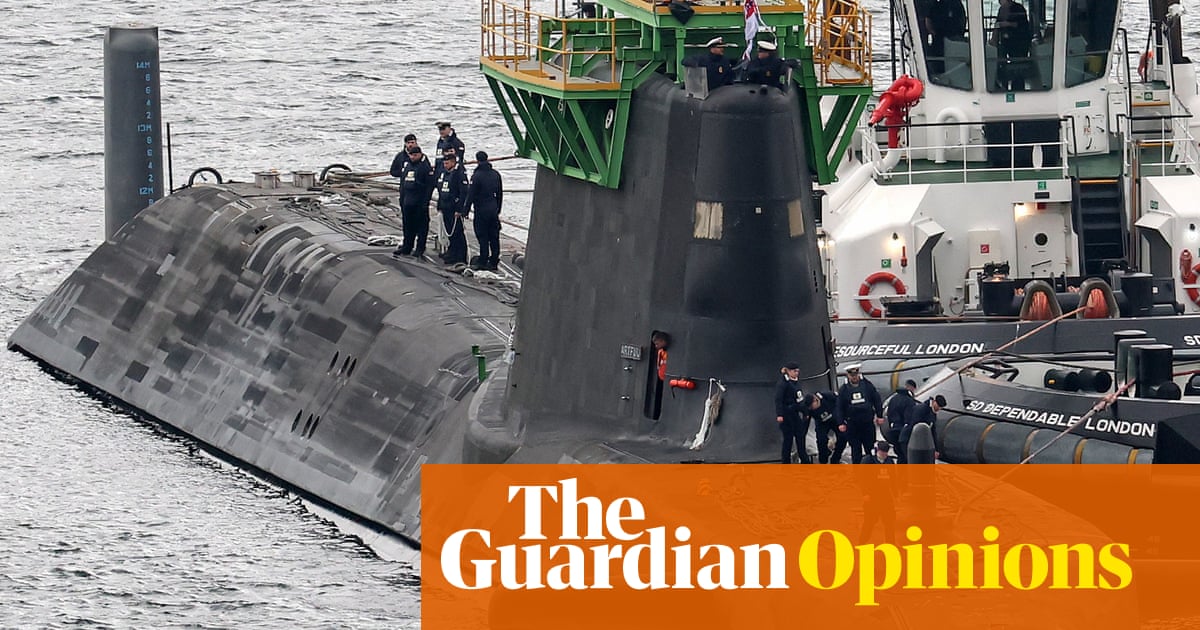The UK government has now unveiled its strategic defence review (SDR), positioning it as a bold response to global threats, particularly from Russia. The plan includes increasing defence spending to 2.5% of GDP by 2027, with aspirations to reach 3% in the next parliament.
The government’s narrative suggests that increased military spending will enhance national security and stimulate economic growth. However, this perspective neglects the immediate threats facing UK citizens: underfunded public services, a strained National Health Service and the escalating climate crisis.
Redirecting substantial funds to military projects, such as nuclear submarines and warheads, is likely to divert resources from essential sectors that directly affect citizens’ daily lives. Investments in healthcare, education and renewable energy not only address current societal needs but also contribute to long-term national resilience. Globally, on average more than24,000 people die of hunger dailyand cutting our aid budget will worsen this tragic situation.
The UK’s defence procurement history is marred by inefficiencies and mismanagement. The government’s hugely ambitious strategic defence review is an exercise in hope over experience. For many years big defence projects have been delayed as a result of unforeseen technical problems partly caused by overoptimistic military planners and advisers influencing gullible ministers. Defence officials are highlighting the plan for a big increase in the number of nuclear-powered attack submarines, yet the cost of the existing, and much-delayed, Astute class submarine fleet, has already increased from an estimated£4.3 bn to more than £11bn.
Meanwhile, spending on nuclear weapons has increased significantly more than anticipated and serious problems remain over the project to build a new fleet ofDreadnought nuclear missile submarines. Although the government suggests that priority should be given to the defence of Europe where, it says, the main threat to Britain’s security lies, it invests in expensive and vulnerable aircraft carriers for deployment elsewhere, including the far east.
The government’s review risks repeating past mistakes by committing to large-scale projects that have led to wasted resources and unmet objectives. Furthermore, while theUK spends more on defencethan all but five other countries in the world already, evidence indicates that military build-up actuallyincreases the likelihood of conflict.
Keir Starmer has also argued that defence projects will stimulate the economy. Yet investments in sectors such as renewable energy and public infrastructure have demonstrated more consistent returns and broader societal benefits.
The review claims that the defence strategy will support 400,000 UK jobs, including 25,000 in Scotland. While job creation is vital, the number, quality and sustainability of these jobs warrant scrutiny. There is likely to be a net loss of jobs as a result of shifting funding from other sectors.Analysis for the Scottish governmentshowed that military spending has one of the lowest “employment multipliers” of all economic categories, ranking 70 out of 100 in terms of numbers of jobs generated. Much of the defence spending will probably be on weaponry from the US.
Furthermore,recent researchis clearly showing that global boosts in defence spending will worsen the climate crisis. A2020 report by Scientists for Global Responsibility and Declassified UKfound that the UK military-industrial sector already produces greater quantities of carbon emissions than 60 countries. While the Ministry of Defence acknowledges the environmental impacts of its operations, its proposed solutions, particularly increased biofuel and nuclear, even where lower in carbon emissions,still threaten ecosystems, biodiversity and human health. In the light of these concerns, it’s imperative to consider alternative strategies that prioritise human security and sustainable development.
A group of academics, trade unionists and campaign groups has drafted analternative defence review, a civil society response to the government’s SDR. We call for a radical break with successive UK governments’ failed security and defence policies, which distort Britain’s national priorities, fuel global instability, undermine international law, harm the environment and divert investment from public services and social infrastructure towards subsidies for the global arms industry. Our ADR suggests that most of this increased spending appears to be linked to policy influence by international arms companies.
By reallocating resources towards healthcare, education and climate resilience, the UK can address immediate domestic challenges while contributing to global stability. Such an approach not only enhances national security but fosters economic growth through the creation of sustainable jobs and industries.
The strategic defence review presents an opportunity to redefine the UK’s security priorities. However, by focusing predominantly on military expansion, it risks neglecting the pressing needs of its citizens and repeating past procurement failures. It’s time for the UK to embrace a holistic security strategy that truly addresses the challenges of the 21st century.
Karen Bell is professor of social and environmental justice at the University of Glasgow. Richard Norton-Taylor, a former Guardian security editor and now contributor to Declassified UK, also contributed to this article
Do you have an opinion on the issues raised in this article? If you would like to submit a response of up to 300 words by email to be considered for publication in ourletterssection, pleaseclick here.
